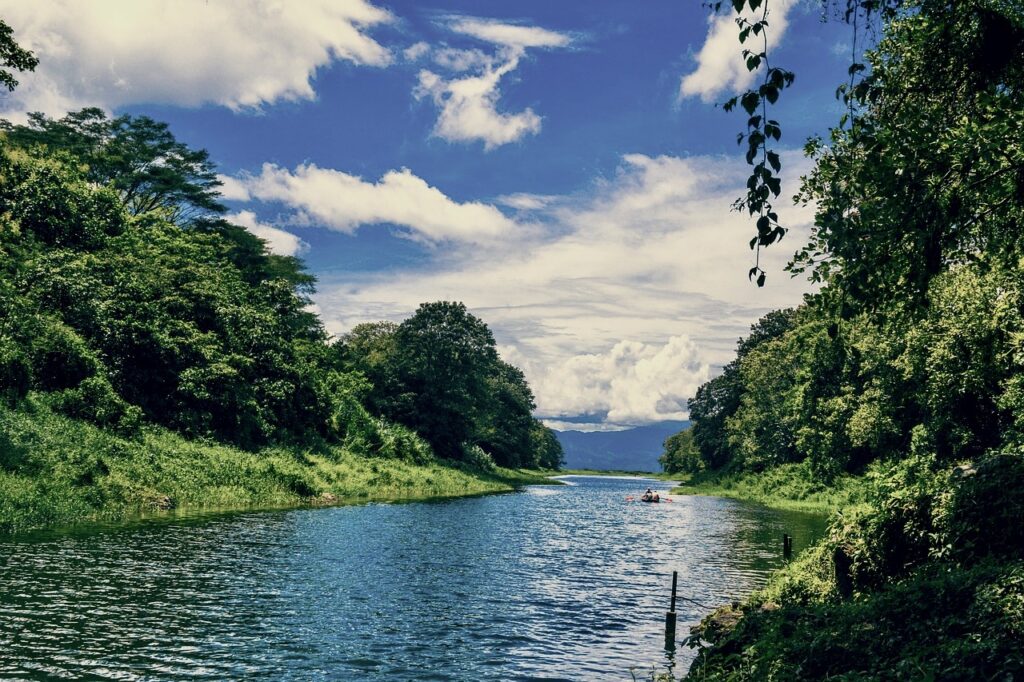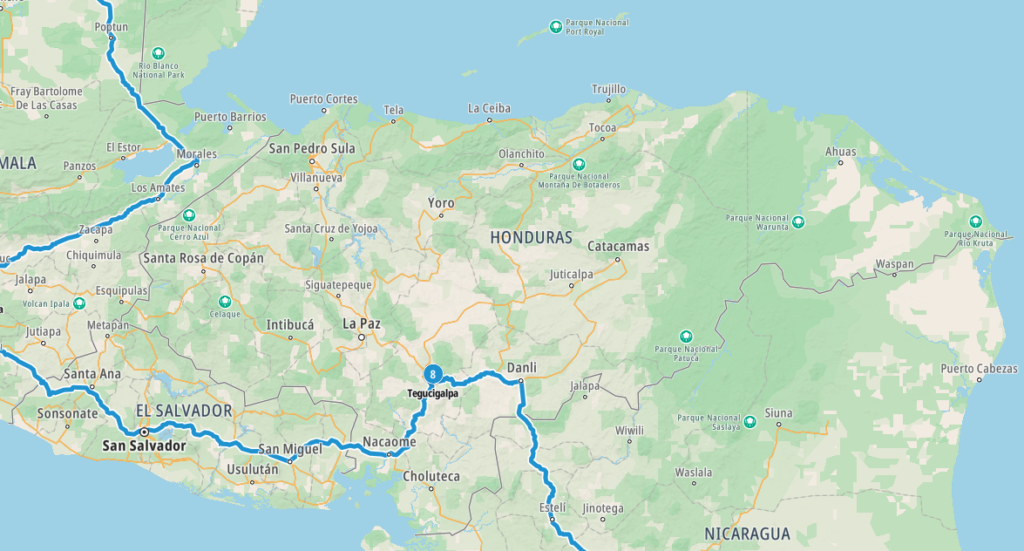Honduras / Republic of Honduras / República de Honduras – Let’s explore here

What’s it like in Honduras?
Honduras is a country in central America, about half the size of the United Kingdom. The country consists mainly of mountains, with narrow plains along the coasts. A large lowland jungle lies in the northeast, and in the northwest there is a heavily populated lowland valley. The highest point is Mount Cerro Las Minas, at 9,420 feet (2,870 m) above sea level.
Honduras’ population is around ten million (2023) and its capital, Tegucigalpa is home to almost 1½ million.

A bit about the history of Honduras
Pre-Columbian Era
Before the arrival of the Spanish, the region now known as Honduras was inhabited by several indigenous groups, most notably the Maya. The Maya civilisation thrived in the Copán region, located in the western part of present day Honduras. The Maya were skilled in agriculture, astronomy and architecture, and their civilisation flourished between the 5th and 9th centuries AD. Other groups, such as the Lenca and the Nahua, also lived in the area, each with their own distinct cultures and traditions.
Spanish Colonisation
Honduras was first explored by the Spanish in 1502, when Christopher Columbus arrived on the Caribbean coast during his fourth voyage. The area was soon claimed by Spain, and in 1524, Spanish conquistador Hernán Cortés sent his lieutenant, Pedro de Alvarado, to subdue the indigenous populations. The Spanish established their colonial rule over the region, which was part of the larger Captaincy General of Guatemala. The indigenous peoples of Honduras faced harsh treatment, including forced labour and the spread of diseases brought by the Europeans, which decimated their populations.
Independence from Spain
Honduras, along with other central American territories, gained independence from Spain on 15 September 1821. Initially, Honduras became part of the Mexican Empire under Emperor Agustín de Iturbide. However, after the fall of the Mexican Empire in 1823, the country joined the Federal Republic of Central America, a federation of the five central American nations. This federation struggled with internal divisions, and Honduras eventually withdrew in 1838, becoming an independent republic.
The 19th Century and Political Instability
The 19th century in Honduras was characterised by political instability, with frequent changes of government and civil wars. The country was plagued by conflicts between conservative and liberal factions, who fought over issues such as land ownership, the role of the church, and the extent of government power. This instability made it difficult for Honduras to establish a strong central government.
The United Fruit Company and US Influence
In the late 19th and early 20th centuries, foreign corporations, particularly the United Fruit Company (an American company), played a significant role in Honduras’ economy and politics. The company controlled vast plantations and infrastructure, such as railways and ports, and its influence on the government was substantial. This period saw the rise of what became known as the ‘Banana Republics’, where the interests of American companies often shaped the political landscape of small central American nations.
20th Century and Military Dictatorships
The 20th century was marked by a series of military coups and dictatorial regimes. In the 1950s, political instability continued, with multiple changes in government and growing dissatisfaction with the influence of the United States. A particularly important moment in modern Honduran history was the 1970s and 1980s, when the country was heavily affected by the Cold War and the political struggles between communist and anti-communist forces in central America. The United States, as part of its efforts to curb the spread of communism, supported military governments in Honduras during this time.
The 1980s and the Contra War
Honduras became a significant player in the regional conflicts of the 1980s, particularly in the context of the Nicaraguan Contra War. The country served as a base for US-backed contra rebels who were fighting against the Sandinista government in Nicaragua. This involvement led to increasing military presence and political turmoil, as well as human rights abuses, particularly in the rural areas of the country.
Return to Democracy
In 1982, Honduras transitioned to a civilian government after years of military rule. The first free elections in over a decade were held, and Roberto Suazo Córdova became the first democratically elected president since the 1970s. Although the transition to democracy marked a significant step forward, political instability and corruption continued to plague the country throughout the 1990s and 2000s.
The 2009 Coup and Aftermath
One of the most significant recent events in Honduran history was the 2009 military coup, which ousted President Manuel Zelaya. The coup was widely condemned by the international community, and the aftermath saw widespread protests, human rights violations and political turmoil. The country struggled to rebuild its democratic institutions in the wake of the coup, and Zelaya, despite being exiled, remained a prominent figure in Honduran politics.
Contemporary Honduras
In recent years, Honduras has continued to face challenges, including high levels of violence, poverty and corruption. Drug trafficking, gang violence, and the lack of opportunities for the youth have contributed to a growing crisis, leading many to flee the country in search of a better life. Despite these struggles, Honduras has made efforts to improve its governance and address issues such as education, healthcare and human rights.

Honduras road trip
Our Honduran road trip is part of a much larger North American road trip.
Our planned Honduran road trip takes us from El Salvador, heading towards the capital, Tegucigalpa, before moving on to Nicaragua.
No doubt we’ll explore the country much more than this continent-spanning short route shows, in particular checking more of the coast and inland Honduras.
Hopefully our journey will improve our knowledge of this intriguing and beautiful country, and enable us to meet some interesting people. We’ll be updating this page at that time – don’t forget to check back 🙂
Map of our road trip through Honduras

What’s it like to drive in Honduras?
We’ve also created a dedicated page to driving abroad, which you might find helpful 🙂
What currency do they use in Honduras?
In Honduras they use the lempira. The US dollar is also widely accepted. Cash is widely used. The use of credit / debit cards is widely accepted in major cities, although not in rural areas. Travellers cheques are not accepted in the main. There are ATMs in cities, although not all accept foreign issued cards.
You should make yourself aware of the amount that your bank charges you for using credit and debit cards abroad. Often credit cards are cheaper for purchasing items directly, and for withdrawing cash from ATMs.
What language do they speak in Honduras?
They speak Spanish in Honduras.
What time zone is Honduras in?
Remember, when you’re planning your next trip to take a look at what time zone it’s in.
Do I need a visa to visit Honduras?
We’ve created a dedicated, more comprehensive page on visas, which you should find helpful. Check it out!
Is wild camping legal in Honduras?
Yes, wild camping is fine in Honduras, although make sure the land is not private or being used for the cultivation of narcotics.
What plug / socket type do they use in Honduras?
In Honduras they use plug / socket types A and B.


Health issues in Honduras
Is it safe to drink water in Honduras?
No, it is not safe to drink tap water in Honduras. Bottled water is readily available across the country.
What vaccinations are required for Honduras?
This NHS website is kept up to date with all relevant information on vaccinations in Honduras.
Phones in Honduras
What is the country calling code for Honduras?
The country calling code for Honduras is +504
What are the emergency phone numbers in Honduras?
- The emergency number for police in Honduras is: 911
- In Honduras, the emergency number for ambulance is: 195
- The emergency number for fire in Honduras is: 198
If you’ve got some useful info that you’d like to share, let us know!
And don’t forget to check out all the other pictures!
